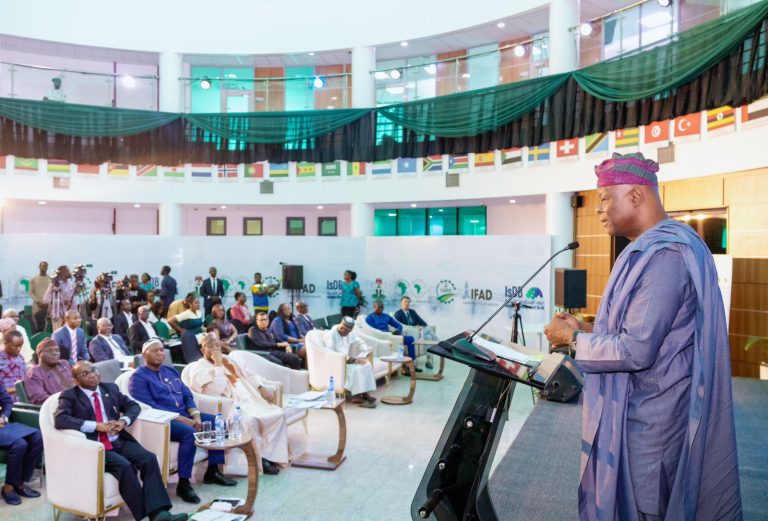The federal government has rallied relevant stakeholders to accelerate the implementation of phase 1 of the Special Agro-Industrial Processing Zones programme (SAPZ-1) in Nigeria initiated in 2022 by the African Development Bank (AfDB).
In order to accelerate the implementation, a high-level dialogue was convened on Monday at the African Development Bank (AfDB) Country Office in Abuja.
According to a press statement by the Ministry of Finance, the “SAPZ-1 High-Level Implementation Acceleration Dialogue and States Steering/Technical Committee Workshop” brought together key stakeholders from state governments, the private sector, and development partners to address implementation challenges and drive progress in the nation’s agricultural transformation.
The Honourable Minister of Finance and Coordinating Minister of the Economy, Mr. Wale Edun, at the Workshop, highlighted the strategic role of the SAPZ-1 programme in transforming Nigeria’s agricultural sector into a key driver of economic growth and industrialisation.
He emphasised the importance of collaboration between the federal government and the private sector in achieving increased domestic production, job creation, and poverty alleviation, noting that “the private sector is crucial for achieving the President’s vision of industrialization and sustainable economic growth.”
The Finance Minister underscored the urgency of the programme, emphasizing the need for a successful wet and dry season harvest to address inflation, stabilize the exchange rate, and lay the groundwork for future investment.
“Our immediate priority is ensuring that food production meets the needs of Nigerians while setting the stage for long-term economic growth. This is pivotal not only for inflation control but also for strengthening the nation’s overall economic stability”, Edun said.
Wale Edun further addressed the need for temporary importation to fill gaps in the short term, stressing that it should not disrupt ongoing efforts in domestic farming and food processing. Instead, these efforts are intended to ensure food availability while positioning Nigeria for export opportunities in the near future.
“The success of this programme will directly impact inflation, interest rates, and the overall investment climate, making it a critical component of our broader economic strategy,” he added.
The SAPZ-1 programme is a strategic investment initiative aimed at industrialising Nigeria’s agricultural sector and fostering inclusive growth across the country. Its first phase is being implemented in seven states and the Federal Capital Territory, with the support of international development financiers such as the AfDB, Islamic Development Bank (IsDB), and the International Fund for Agricultural Development (IFAD).
In October 2022 when the programme was initially launched, a funding of $538 million was projected to finance the phase 1 of the programme. Out this sum, the African Development Bank pledged to provide funding of $210 million, with the Islamic Development Bank and the International Fund for Agricultural Development (IFAD) jointly providing $310 million. The Nigerian government was billed to contribute $18.05 million as its counterpart funding.
The workshop brought together key stakeholders working on the programme including Sen. Abubakar Kyari, Minister of Agriculture and Food Security; Dr. Armstrong Takang, CEO of the Ministry of Finance Incorporated (MOFI); Dr. Abdul Kamara, Director General of the Nigeria Country Department at the AfDB; and other representatives from partner institutions such as IFAD and IsDB.
Discussions focused on overcoming bottlenecks and ensuring that all stakeholders align their efforts to meet the ambitious goals of the SAPZ-1 programme, which aims to modernize Nigeria’s agricultural sector and drive economic growth.
Meanwhile, while providing more insight into the renewed efforts by the Tinubu administration to implement the Special Agro-Industrial Processing Zones programme, the Special Assistant to the President on Social Media, Dada Olusegun listed Cross River, Imo, Ogun, Oyo, Kaduna, Kwara and the FCT as states in which the SAPZ-1 would be implemented in phase 1 of the programme.
Dada Olusegun also stated that the scheme, being implemented in collaboration with AFDB, IFAD and IsDB, is expected to increase Nigeria’s food production on a large scale using sophisticated technologies which will then be replicated in the remaining 30 states. He also listed cassava, rice, maize, cocoa, tomatoes, and livestock production as some of the major priorities of the SAPZ initiative.
The presidential aide also explained that President Tinubu’s plan for agriculture is an all-inclusive one that will ensure sustainability of food production that would transcend his administration.
He added that the federal executive council has approved the establishment of a local assembly plant for farm machineries by JOHN DEERE with a completion time of 6 months. The plant, he said, is expected to deliver 2000 tractors, combine harvesters, disc riders, etc.
Dada Olusegun also stated that about 10,000 of such equipments will be delivered over the next 5 years by the company thereby creating more jobs and preserving our forex instead of importation of the equipments.

